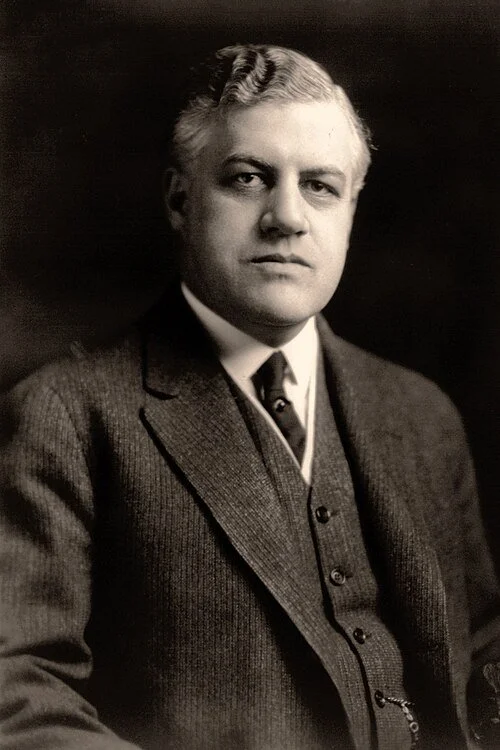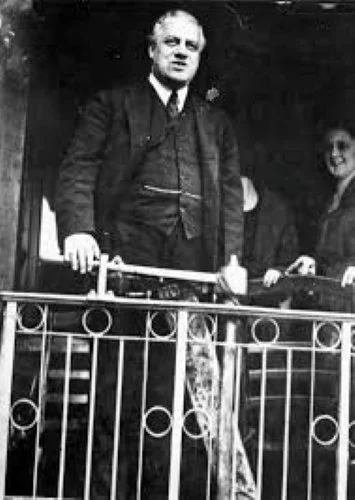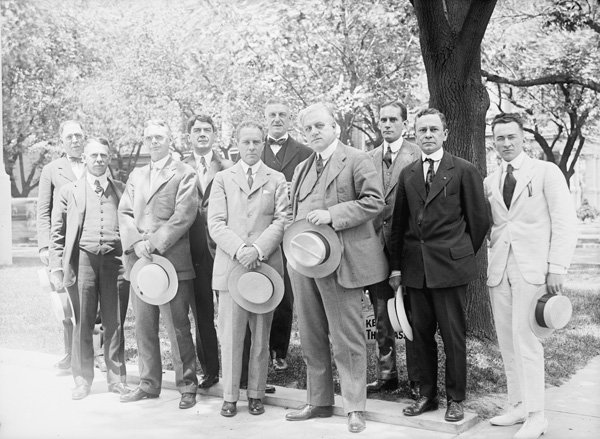Aaron Fulch
Photograph of Aaron Fulch, he wears a suit, tie, and vest with a watch chain dangling from it. The man himself has cleanly cut hair, sunken shadowed eyes, and an unfeeling blunt expression to his features, his lips are turned in the form of a perpetual grimace and there is no mirth or humor about him.
Aaron Fulch: entrepreneur, charlatan, noted royalist, kingpin of the candy industry. A man who has done immeasurable damage and much like his beloved Factory Number Nine has faded into obscurity within the last several decades.
Born into a wealthy family, Fulch's recollections note the relationship between his mother and father being very distant. His parents rarely, if ever, were seen with their children and as soon as they were able sent the children off to boarding schools in different parts of the country. Thus, notes Fulch, he never truly knew his brothers and sisters either, only seeing them when the family gathered for holidays and funerals. Despite this distance Fulch was the favorite (or most tolerated) of his parents' children. He would be gifted most of if not all of their inheritance, with Fulch secluding himself following their deaths and cutting off all contact with his relatives. These are all the details we can glean of Fulch’s early years, with the rest being lost to the ages and deliberate sabotage on his part. Fulch was smitten with the mythology of the self made american man and thus did everything in his power to conceal the source of his success. In official Bartlebee Brand history articles and promotional materials, the company is listed as being started by Aaron Fulch in 1883. It is stated that with the help of peers and his own hard work, it took many years for the company to take off and that Fulch would often work extra hours - all in order to bring the idea of the company to life.
Aaron Fulch giving a speech at the opening of Bartlebees third factory. He is standing on a balcony and addressing a crowd, his hands both grip the railing and he wears his usual suit and tie, he has a semi smirk breaking through his usual grimace as he speaks.
These details are, bluntly, big fibs on the company's part. In no small part because the company known as Bartlebee Brands had been in existence well before Aaron Fulch's birth. Despite doing everything in his power to burn away history and make it appear otherwise, Aaron Fulch was not the creator of Bartlebee Brands. Bartlebee Brands, starting its life as Bartlebee Sweets, was a small local candy store run by Eric Bartlebee and his wife Daliah; the two also acting as beekeepers within the community. In 1883, Fulch would approach the duo with the offer of helping them to expand their business which was eventually, after much pestering on Fulch’s part, accepted. In the memoirs of Eric Bartlebee, he stated that the first time Fulch saw their store he loved it and wanted to be a part of it. He thought that the name Bartlebee had promise, and that with it he could propel the name into the shelves of candy stores all over America. Using his wealth Fulch would expand the company into a small chain of stores under the name of “Bartlebee Candies and Goods,” which did fairly well to show Eric and Daliah what Fulch could do for them. Fulch was incredibly close with the two, presenting himself as a guardian figure that had their best interests in mind. If the couple had any inclinations of what Fulch was planning they never acted upon them. In his personal journals Fulch stated he was very careful to keep the two placated and took very little in the way of profit, but little by little he would begin to push his way further into the company, taking more control of ventures and making decisions behind his business partners’ backs.
Among these shadier ventures was the destruction of potential competitors. Using his influence and wealth Fulch would run local businesses out of town before replacing them with Bartlebee stores. The worst of his plans however came into effect in 1902 when he, to the surprise of his partners, tricked them into signing over the company and all assets to him including the Bartlebee name. The two were restricted from using their name in any business ventures or marketing themselves as the founders of Bartlebee, given a small monthly payment for their troubles, and kicked out of the company. From this point on Fulch proceeded to expand Bartlebee Brands, pushing into other avenues of the food industry and, by the 1930s, having established five factories for the company.
To the public Aaron Fulch would present himself as a fatherly/uncle-like figure, first addressing readers in news articles and then, as it was introduced, making appearances on radio ads to discuss the state of the company. In these broadcasts he liked to make it out as if the public was involved in the management of the company, asking listeners to send in tips for upper management and treating every big event as a success brought about through the hard work of American citizens. He notably was a very pleasant and polite man in public interactions, and was once referred to as “the gentlest gentleman in business.” Of course this is just the Fulch curated and shown to the public, as you’ve already seen he was a ruthless business man, and from collected accounts working with the man was a “six layered nightmare.” In the memoirs of upper management he was noted as being indecisive, petty, quick to take offense to the mildest criticism, and prone to entering screaming fits in order to get what he wanted. Once, Fulch fired the entire staff of a company project because they showed up early to show him their progress. On another occasion he nearly flung a close colleague into traffic because he dared suggest a different way of running the business.
An extremely low quality image of Marygold Fulch, a morose faced child with long blonde hair and a white bow. The image is so pixelated that the details are nearly illegible to the eye.
In regards to his personal life, the one spot of affection Fulch had was for his daughter Marygold Fulch. Marygold, the child born from a partnership between Aaron and a still to this day unknown woman, was very secluded from the public eye to the point there exists only one public photograph of the girl. Not much is known about her except that she was ostensibly the original creator of Beetrice B.E. (Although considering everything we know about Aaron Fulch this could be further embellishment of history.) Her father often mentioned her in his writings and speeches, discussing the necessity of preserving the country's integrity and values for little girls like her.
Fulch was a rigid believer of American values, although what defined American values seemed to switch back and forth for him. The political ventures of his company are lesser known, yet with research one finds that Fulch had his fingers in many different pies; from the funding of anti-union organizations to aiding in the establishment of the Huxley foundation, the group dedicated to rooting out liberal and progressive values in not only the community but the government. Much of the man's actions were also influenced by his royalist sentiments. From his own words, Fulch was a royalist who dreamed of the return of a monarchy to the states. Not the British, but some vague and unobtainable figurehead who could push America back on track. In his own biography Fulch wrote:
“In the days of a post monarchist country it is important for man to find new purpose in the absence of what was right and what should have remained. Although we cannot currently reinstate a king to guide our country, us men can take the steps to become kings in our own right. Consider the oil tycoons and railroad owners over at Stencilline; a great example of what man should aim to be. The modern business man is the next great prince building his kingdom and his many franchises, and estates are his castles and conquered territories. With this in mind a business oriented man must take the steps to fill the place left by the kings before; every business deal in of itself a battle and every acquired competitor a victory on par with the wars of old nations.”
In his later years, Fulch became absolutely obsessed with the concept of radio. He poured a lot of money into the development of the technology, even collaborating with Telectria Innovations in a short lived plan to “bring the hum to Americans everywhere” in the form of portable radios. He also became extremely eccentric and often had to be kept out of public view by the board of directors, who considered him to be a liability to the company's image. During this time, confined to his office, Fulch took to writing up multiple projects - among them being the plans for what would later be known as Factory Number Nine.
Aaron Fulch with his board of directors stand in a clearing filled with decorational trees, all hold their hats in their hands and look towards the camera with serious no nonsense expressions. All of the men wear suits and some have pocket watches on chains.




